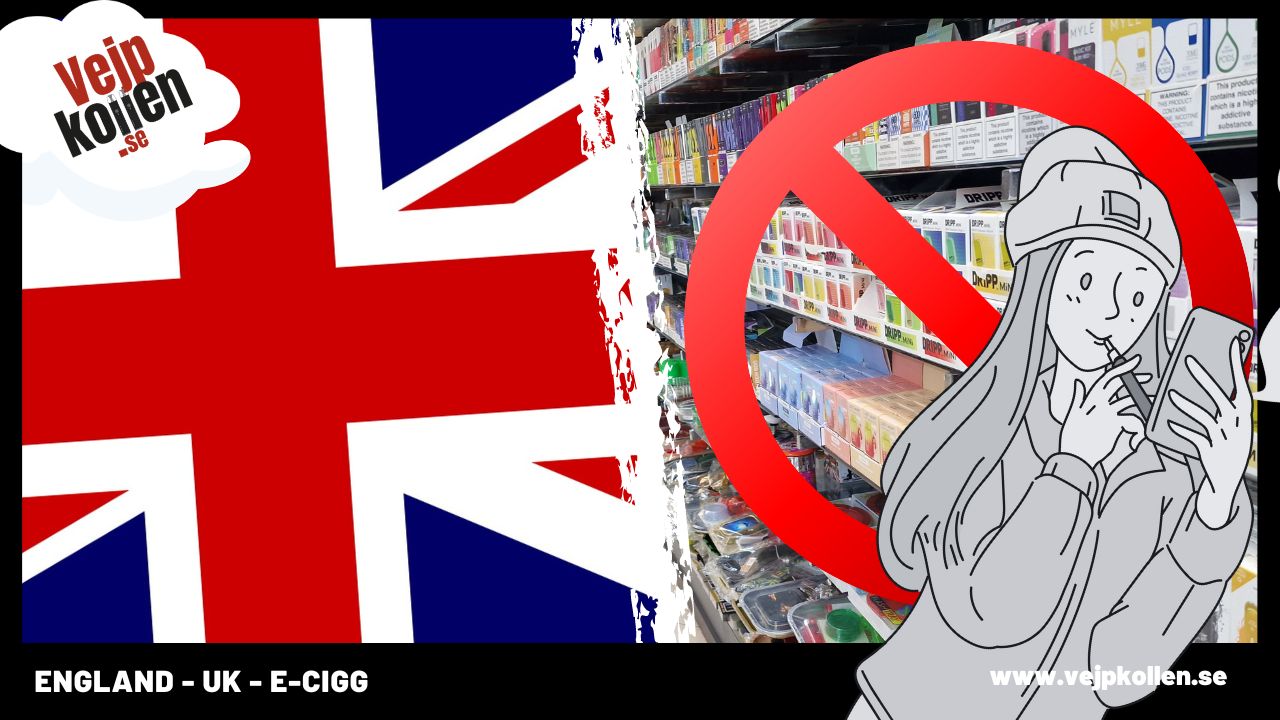The UK government is proposing a ban on the sale of disposable vejps. This comes after the government announced new measures to reduce vejp use among young people in the country. The decision raises concerns among health researchers in the country.
"A ban will affect 1.2 million Britons who use disposable models to quit smoking or stay smoke-free," says health and behavioural scientist Sarah Jackson.
Disposable vejps will be banned in the UK. This was announced by the British government in a press release on Monday. It also introduces an age limit on nicotine pouches and requires less attractive packaging and possible restrictions on flavours. According to the government, there was overwhelming support among responses to the government's consultation with almost 70 per cent of parents, teachers, health professionals supporting the measures.
Not only young people use disposable vejps
Today, nearly 4.7 million Britons use vejpar. Of these, 2.6 million use disposable e-cigarettes. Of these, the majority are younger people in the 18-24 age group. Meanwhile, a fifth of all those who quit smoking with the help of vejping use disposable vejps, as well as 18 per cent of Britons who still smoke.
According to British health and behavioural scientist Sarah Jackson, researcher at University College London which recently investigated the consequences of a ban, the decision will therefore have a major impact on vejp habits. Not least among current e-cigarette users.
"We estimate that a ban on single-use vejps in particular would affect 1.2 million people who smoke and vejp, perhaps to try to quit smoking, and a further 744,000 who have smoked in the past." stated Sarah Jacksson when the study was published. "That's over 2 million Britons who currently use disposable vejps, either to quit smoking or to stay smoke-free"
Sees ban as central
Despite this, the UK government chose to propose a ban on disposable cigarettes. Vaping is certainly the most popular way to quit smoking in the country. But according to the health ministerr Andrea Leadsom the ban will stop uptake among young people, something that a majority of those involved in the national consultation process that led to the decision said they supported, according to the government.
"We are in the midst of a worrying increase in young people who vejp. We want to put our foot down here and a ban on disposable models is central to that work." says Andrea Leadsom in a press release.
At the same time, tightening controls
At the same time, the government wants to increase the penalty for selling e-cigarettes to minors. Several previous reports and industry warnings indicate that the vast majority of young people buy their vejps without age verification (18 years) either through illegal online sources or through small shops.
"To crack down on underage sales, the government will also introduce new fines for shops in England and Wales that sell vejps illegally to children. Local authorities will have the power to act "on the spot" to tackle tobacco and vejp sales to minors. This builds on fines of up to £2,500 that local authorities can already impose." writes the government.
"Helping 70,000 Britons a year to quit smoking"
In contrast to the ban, as recently as January, the UK government launched the programme. "Swap to stop" - a massive effort to get smokers to switch from cigarettes to e-cigarettes. The programme, one of several measures to reduce smoking in the country, will give one million smokers free access to e-cigarettes to quit smoking. The aim is that less than five per cent of the population smokes by 2030.
"E-cigarettes should only be used by adults as a smoking cessation tool. They contribute to between 50,000 and 70,000 additional quit attempts per year in England." writes the government in its press release
"Deterring smokers from e-cigs"
But according to Sarah Jackson the ban goes against that intention.
"A ban on single-use guns is likely to reduce youth 1TP9 behaviour. But it may also have unintended consequences. The risk is that it will discourage smokers from switching to a less harmful product, induce relapse among ex-smokers and potentially exacerbate health inequalities." writes Śarah Jackson in a twitter threadd.
Affecting the most vulnerable smokers
According to the study by University College London the uptake of disposable models has not only been high among younger people in the UK. Socially vulnerable groups, those with mental disabilities and parents with young children are also more likely to use disposable models than other vejp products.
"This suggests that a ban would also have a disproportionate impact on disadvantaged groups who have higher smoking rates and usually find it more difficult to quit." writes Sarah Jackson.
Facts: Wearing and risk of injury
- According to the UK Public Health Agency, using e-cigarettes is likely to be significantly less harmful than smoking. Currently, 7 per cent of Britons use e-cigarettes while 12 per cent still smoke. Single-use models are most commonly used by young people, but several studies have found that use among young people is concentrated among those who already smokes or has smoked in the past. Link:
Nicotine vaping in England: 2022 evidence update main findings - UK authorities are actively encouraging smokers to use e-cigarettes to quit smoking. The National Health Service regularly updates its recommendations to doctors and patients on the potential of the technology. Link:
Using e-cigarettes to stop smoking - According to British Cochrane, an independent institute for evaluating health care interventions, the e-cigarettes, to the same extent as the medicine varenicline., the most effective tool for quitting smoking today. Twice as effective as nicotine patches, for example. Link:
Can electronic cigarettes help people stop smoking, and do they have any unwanted effects when used for this purpose?




